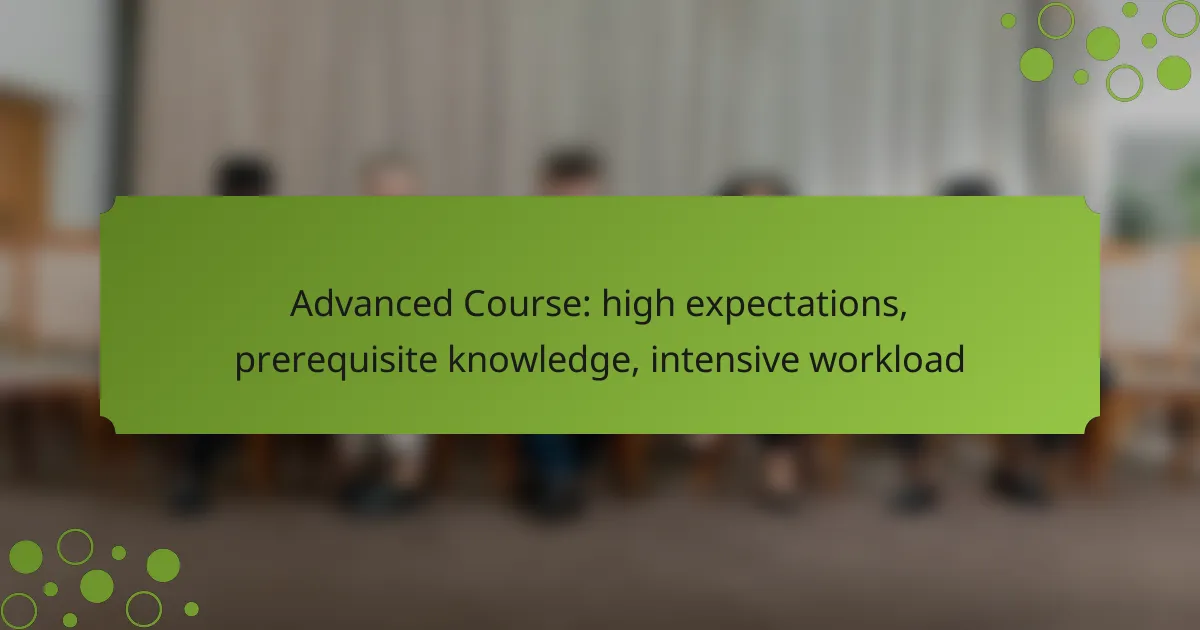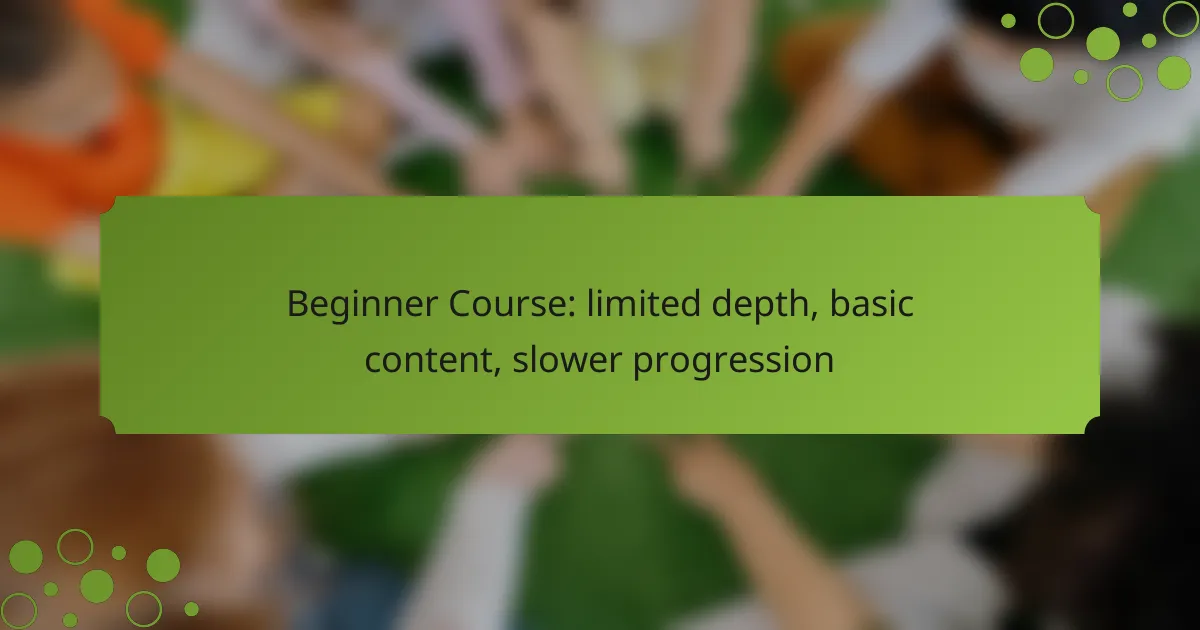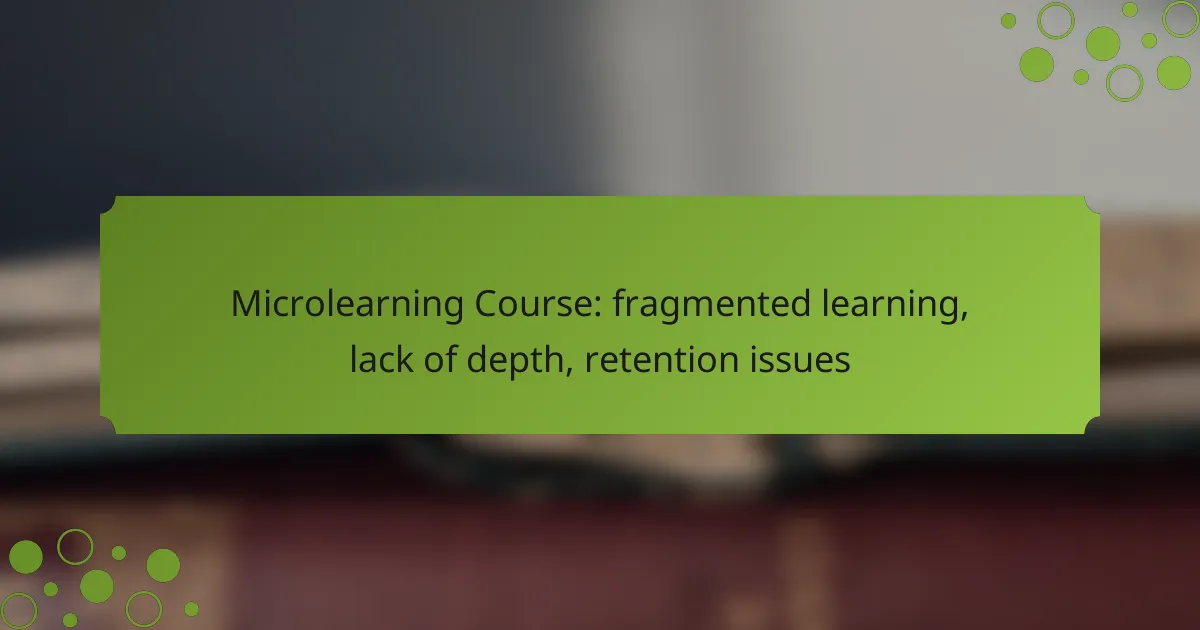Advanced online courses in Canada are designed for students who are ready to meet high academic standards and engage deeply with complex subject matter. These courses require a solid foundation in relevant subjects and demand significant time commitment, making effective time management and resilience essential for success. Understanding the prerequisites and the intensive workload is crucial for students aiming to thrive in this challenging academic environment.

What are the expectations for advanced online courses in Canada?
Advanced online courses in Canada typically demand a high level of academic performance, significant engagement, and a considerable time commitment from students. These expectations ensure that learners are adequately prepared for the complexities of the subject matter and can successfully navigate the intensive curriculum.
High academic standards
Advanced online courses in Canada are designed to uphold rigorous academic standards that challenge students to excel. Participants are often required to demonstrate a strong grasp of prerequisite knowledge, which may include foundational courses or relevant work experience. This ensures that all students are on a level playing field and can engage deeply with the material.
Students should expect to produce high-quality assignments, participate actively in discussions, and achieve strong grades on assessments. Maintaining a consistent level of performance is crucial, as many programs have strict grading policies and may require a minimum grade to progress.
Intensive engagement requirements
Engagement in advanced online courses is often more intensive than in standard classes. Students are expected to contribute regularly to discussions, collaborate on group projects, and participate in live sessions or webinars. This level of interaction fosters a deeper understanding of the subject matter and enhances the learning experience.
To meet these engagement requirements, students should be prepared to allocate time for reading, discussion posts, and group work. Active participation is not just encouraged; it is often essential for success in these courses.
Time commitment expectations
Time commitment for advanced online courses in Canada can be substantial, often requiring several hours per week. Students should anticipate dedicating anywhere from 10 to 20 hours weekly, depending on the course load and complexity of the material. This includes time spent on lectures, readings, assignments, and group work.
To manage this commitment effectively, students should create a structured schedule that allocates specific times for coursework. Prioritizing tasks and setting realistic goals can help prevent last-minute stress and ensure a balanced workload throughout the term.

What prerequisite knowledge is needed for advanced courses?
Advanced courses typically require a solid foundation in relevant subjects, prior coursework, and specific skills. Understanding these prerequisites helps ensure that students are adequately prepared for the intensive workload and high expectations of advanced studies.
Foundational subject expertise
Students should possess a strong grasp of the core concepts related to the advanced course topic. For instance, a student entering an advanced mathematics course should be proficient in algebra and calculus. This foundational expertise enables learners to tackle complex problems and engage with advanced material effectively.
It is beneficial to review key topics and ensure familiarity with essential theories and principles before enrolling. This preparation can include self-study, tutoring, or online courses focused on foundational knowledge.
Prior coursework recommendations
Completing relevant prior coursework is crucial for success in advanced courses. For example, students interested in advanced biology should have completed introductory biology and chemistry courses. These prerequisites help build the necessary background for more complex discussions and applications in the advanced setting.
When planning your course load, consider taking recommended classes that align with your advanced course goals. This strategy not only strengthens your knowledge base but also enhances your confidence in tackling challenging material.
Skill assessments
Many advanced courses may require students to demonstrate their skills through assessments or placement tests. These evaluations help instructors gauge students’ readiness and identify areas needing improvement. For example, a programming course might require a coding assessment to ensure students can handle the course’s technical demands.
Before enrolling, check if the institution offers any assessments and prepare accordingly. Practicing relevant skills can significantly improve your performance and readiness for the advanced coursework ahead.

How does the intensive workload impact students?
The intensive workload of advanced courses significantly affects students by demanding exceptional time management and resilience. Students often face challenges in balancing their academic responsibilities with personal commitments, which can lead to various stress-related issues.
Time management challenges
Students in advanced courses frequently struggle with time management due to the high volume of assignments and projects. Effective prioritization becomes crucial; students should assess deadlines and allocate sufficient time for each task. A common strategy is to break larger projects into smaller, manageable parts to avoid last-minute stress.
Using tools like planners or digital calendars can help students visualize their schedules and keep track of important dates. Setting aside specific study blocks each week can also enhance productivity and ensure that all subjects receive adequate attention.
Stress and burnout risks
The rigorous demands of an intensive workload can lead to increased stress and a higher risk of burnout. Symptoms may include fatigue, anxiety, and decreased motivation, which can negatively impact academic performance. Recognizing these signs early is essential for maintaining mental health.
Students should practice self-care techniques, such as regular exercise, healthy eating, and sufficient sleep, to mitigate stress. Additionally, establishing a support network of peers and mentors can provide emotional relief and practical advice during challenging times.
Support resources available
Many educational institutions offer support resources to help students manage the pressures of an intensive workload. Academic advising, counseling services, and tutoring programs are commonly available to assist students in navigating their studies effectively.
Students should take advantage of these resources, as they can provide valuable guidance and coping strategies. Joining study groups or participating in workshops can also foster a sense of community and shared learning, which can alleviate feelings of isolation during demanding periods.

What are the benefits of enrolling in advanced online courses?
Enrolling in advanced online courses offers significant advantages, including improved career prospects, valuable networking opportunities, and access to knowledgeable instructors. These benefits can enhance both professional growth and personal development.
Enhanced career opportunities
Advanced online courses can significantly boost your career opportunities by equipping you with specialized skills that are in high demand. Employers often seek candidates with advanced knowledge, which can lead to higher salaries and more senior positions.
Consider fields like technology, finance, or healthcare, where advanced certifications can make a noticeable difference in job prospects. For instance, a professional with a specialized certification may earn tens of percent more than those without it.
Networking with industry professionals
Participating in advanced online courses allows you to connect with industry professionals, which can be invaluable for career advancement. These connections can lead to mentorship opportunities, job referrals, and collaborations on projects.
Many online programs include forums, discussion groups, or live sessions where you can interact with peers and instructors. Engaging actively in these communities can help you build a robust professional network.
Access to expert instructors
Advanced online courses often feature instructors who are experts in their fields, providing insights that go beyond textbook knowledge. Learning from these professionals can enhance your understanding and application of complex concepts.
Look for programs that highlight their instructors’ credentials and industry experience. This access can also facilitate direct feedback on your work, helping you to refine your skills and knowledge effectively.

How to choose the right advanced online course?
Choosing the right advanced online course involves evaluating several key factors, including accreditation, instructor qualifications, and how well the curriculum aligns with your career goals. Prioritize these elements to ensure the course meets your expectations and supports your professional development.
Course accreditation and recognition
Accreditation is crucial as it indicates that the course meets certain quality standards set by recognized educational bodies. Look for courses accredited by reputable organizations, as this can enhance the value of your qualification in the job market.
Additionally, check if the course is recognized by industry associations relevant to your field. This recognition can provide an edge when applying for jobs or promotions, as employers often prefer candidates with accredited credentials.
Instructor qualifications
The qualifications of the instructors can significantly impact your learning experience. Research their educational background, professional experience, and any relevant certifications to ensure they have the expertise to teach the subject matter effectively.
Consider looking for courses where instructors have practical experience in the field, as they can provide real-world insights and examples that enhance your understanding of complex topics.
Curriculum alignment with career goals
Ensure that the course curriculum aligns with your specific career goals and aspirations. Review the course syllabus to see if it covers the skills and knowledge areas that are most relevant to your desired job role or industry.
It can be helpful to compare the course content with job descriptions in your field to identify any gaps. If possible, reach out to alumni or current students to gain insights into how the course has benefited their careers.

What are the emerging trends in advanced online education?
Advanced online education is increasingly characterized by personalized learning experiences, integration of artificial intelligence, and a focus on skill-based outcomes. These trends reflect the growing demand for flexible, accessible, and relevant educational opportunities that meet the needs of diverse learners.
High expectations from students and institutions
Students and institutions alike have elevated expectations for advanced online education. Learners seek programs that not only provide knowledge but also foster critical thinking and real-world applications. Institutions are responding by enhancing curriculum quality and ensuring that courses align with industry standards.
To meet these expectations, educational providers often implement rigorous assessment methods and continuous feedback loops. This ensures that students are not only engaged but also achieving the desired learning outcomes.
Prerequisite knowledge for advanced courses
Advanced courses typically require a solid foundation of prerequisite knowledge. This ensures that all participants are adequately prepared to tackle complex concepts and engage in higher-level discussions. Common prerequisites may include introductory courses in the relevant field or specific skill sets.
Students should carefully review course descriptions and syllabi to identify necessary prerequisites. Engaging in preparatory courses or self-study can help bridge any knowledge gaps before enrolling in advanced programs.
Intensive workload in advanced online education
Advanced online education often involves an intensive workload that demands significant time and effort from students. This includes a combination of readings, assignments, projects, and participation in discussions. Students should be prepared for a rigorous academic environment that requires effective time management and self-discipline.
To navigate this workload successfully, students can create a structured study schedule, set realistic goals, and prioritize tasks. Utilizing digital tools for organization and collaboration can also enhance productivity and ensure timely completion of assignments.



